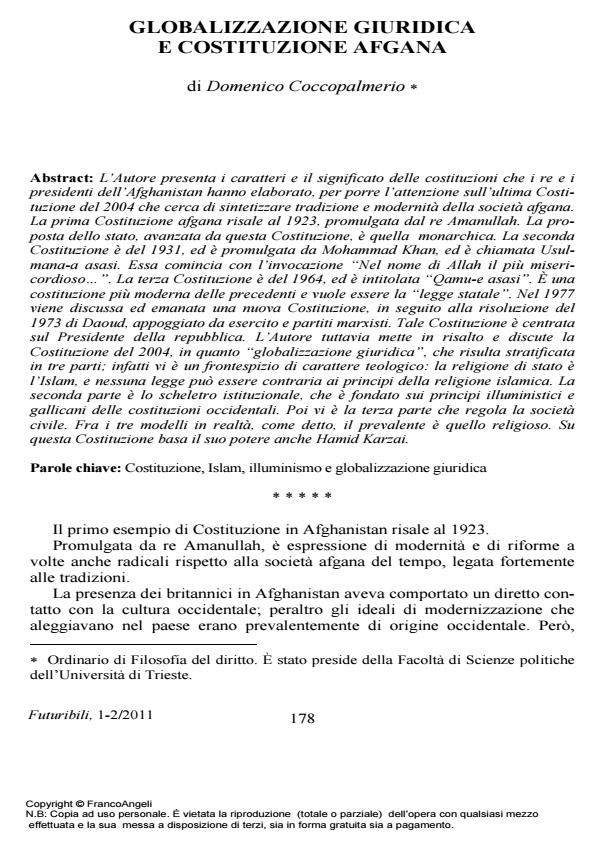Juridical globalisation and the Afghan constitution
Journal title FUTURIBILI
Author/s Domenico Coccopalmerio
Publishing Year 2011 Issue 2011/1-2
Language Italian Pages 9 P. 178-186 File size 259 KB
DOI 10.3280/FU2011-001012
DOI is like a bar code for intellectual property: to have more infomation
click here
Below, you can see the article first page
If you want to buy this article in PDF format, you can do it, following the instructions to buy download credits

FrancoAngeli is member of Publishers International Linking Association, Inc (PILA), a not-for-profit association which run the CrossRef service enabling links to and from online scholarly content.
The Author outlines the characteristics and significance of the various constitutions drawn up by kings and presidents of Afghanistan, focusing on the most recent, adopted in 2004, which seeks to accommodate tradition and modernity in Afghan society. The first Afghan constitution, promulgated in 1923 by King Amanullah, contemplated a monarchic state. It was followed by the 1931 constitution, which was promulgated by Mohammad Khan, named Usulmana-a asasi and began with the invocation "In the name of Allah the most merciful...". The third constitution, a more modern document adopted in 1964 and entitled Qamu-e asasi , set itself up as the "state law". Another constitution was discussed and adopted in 1977 as a result of a resolution to that effect by President Daoud, who was supported by the army and Marxist political parties. Its linchpin was the President of the Republic. As an example of "juridical globalisation", the 2004 constitution is constructed in three layers. The basis contained in the frontispiece is theological in character - the state religion is Islam and no law may run counter to its tenets. The second layer is the institutional framework, founded on the Enlightenment and Gallican principles of Western constitutions. The third layer sets out to regulate civil society. Of the three models the first, the religious one, is the predominant element. It is on this constitution that President Hamid Karzai’s power is based.
Keywords: Costituzione, Islam, illuminismo e globalizzazione giuridica
Domenico Coccopalmerio, Globalizzazione giuridica e costituzione afgana in "FUTURIBILI" 1-2/2011, pp 178-186, DOI: 10.3280/FU2011-001012